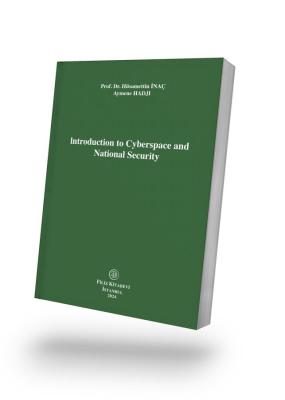lntroduction to Cyberspace and National Security (E-Kitap)

Table of contents
lntroduction . 1
Pare 1: Theoretical and conceptual F ramework of na ti o nal Security and cyberspace . 5
Chapter 1: An lntroduction to National Security . 5
Topic 1: The concept of national Security 5
I- Signs of the emergence of the concept of national Security 5
II- Defınition of national security . 7
Ill- The connection between national security and national interest: . 8
IV- National security characteristics: . 9
V- National security determinants: 10
1. Set of internal environment parameters: . 10
2. A group of external environment determinants: 11
VI- Levels and dimensions of na ti o nal security 11
1- National security levels . 11
2- Dimensions of national security . 13
Topic 2:The most important trendsin security snıdies: 15
1- The traditional direction of national security: 15
11-Contemporary trend of national security: . 16
Topic 3: threats to national security 17
1- The concept of security threats 17
1) Defınition of security threats 17
2) Security threats and similar concepts: . 18
3) The security phenomenon that transcends the borders of the
nation-state: . 19
4) The emergence ofa new type of security threats that were not known
before: 19
il- Classifıcations of security threats: . 20
1- ln terms of fıeld, . 20
2- According to the degree of risk . 21
3- According to the degree of symmetry . 21
Chapter 2:Cyberspace and the transformation in the concepts of power and conflict. . 22
T opic l: c-yberspace and power shifts 23
1-The concept of cyberspace: 23
11-Power shifts and the emergence of cyber power. . 23
Ill- actors in the fıeld of cyber power. . 25
1\1-cyber conflict 25
Topic 2: The concept of cybersecurity and cyber threats . 27
I-the concept of cybersecurity and its dimensions 27
1- Definition of cybersecurity . 27
2- Dimensions of cybersecurity . 27
II- patterns of cyber threats . 30
Part 2: National security and mechanisms for confronting c-yber threats . 33
Chapter 1: the relationship of cybersecurity to na ti o nal security . 33
Topic 1: Cybersecurity is a new tributary to national security . 33
T opic2: the new security doctrine . 3 5
Chapter 2: Cyber risks to society and national sovereignty 36
Topic 1: cybercrime . 36
I- The concept of c-ybercrime: . 36
il- Characteristics of cybercrime: . 37
lll- Cybercriminals: 37
IV- The most inıportant cybercrimes: . 38
T opic 2: cyber terrorism . 38
1- Defini tion of cyber terrorism . 38
11-The means of cyber terrorism . 38
TV
III- Terrorist groups' use of cyberspace 39
lV- Manifestations of the threat of cyber terrorism to the security of countries 39
T opic 3: c-yber wars . 41
1-The concept of cyber warfare: 41
11-Characteristics of cyber wars . 42
III- The repercussions of cyber wars on national security . 42
T opic 4: electronic risks to society and sovereignty . 43
1-The impact of social networking sites on societal security: . 43
1- Defınition of social networking sites: 43
2- The emergence of social networking sites: 44
3- Characteristics of social networking sites: . 45
4- Examples of social networking sites: . 45
A- Facebook 45
B- T witter: 46
C- lnstagram: 46
D- YouTube: 46
E- Linkedln website 47
11-The impact of social networking sites on societal security . 47
Chapter 3: countries' efforts to confront c-yber threats 48
T opic 1: na ti o nal efforts to secure cyberspace 48
1-Building cyber armies: . 48
II- Forming national cybersecurity bodies: 48
III- National cybersecurity legislation 56
Topic 2: lnternational efforts for a peaceful cyberspace - . 56
I- Limiting the c-yber arms race 56
II-Tallinn Law . 57
III- Regional and international agreements on cybersecurity . 58
V
Topic 3: The confrontational policies and cyber strategy of ehe United States of
America as a model. 59
I- The imporcance of cybersecurity in ehe US national security strategy 59
il- the cyber strategy of the United States of America 61
1. ln the fıeld of economics: promoting inrernational standards, innovation
and free markers . 61
2. In the field of protecting networks and enhancing security, reliability and
flexibility 61
3 ln the fıeld of law enforcemenr: expanding international cooperation and
the rule of la w . 62
4. In the military fıeld: preparing for the security challenges of the 21st
century . 62
5 ln the field of lnternet governance: Promoting effective and comprehensive
structures 62
6. In the fıeld of international development: capacity building and achieving
security and prosperity 62
7. ln the fıeld of lnternet freedom: supporting basic freedoms and privacy . 63
lll- The United States confronts cyber threats . 63
1- Governmental bodies for cybersecurity . 63
2- American capabilities in cyber def ense and attack. 64
Condusion . 67
List of sources and references 75
- Açıklama
Table of contents
lntroduction . 1
Pare 1: Theoretical and conceptual F ramework of na ti o nal Security and cyberspace . 5
Chapter 1: An lntroduction to National Security . 5
Topic 1: The concept of national Security 5
I- Signs of the emergence of the concept of national Security 5
II- Defınition of national security . 7
Ill- The connection between national security and national interest: . 8
IV- National security characteristics: . 9
V- National security determinants: 10
1. Set of internal environment parameters: . 10
2. A group of external environment determinants: 11
VI- Levels and dimensions of na ti o nal security 11
1- National security levels . 11
2- Dimensions of national security . 13
Topic 2:The most important trendsin security snıdies: 15
1- The traditional direction of national security: 15
11-Contemporary trend of national security: . 16
Topic 3: threats to national security 17
1- The concept of security threats 17
1) Defınition of security threats 17
2) Security threats and similar concepts: . 18
3) The security phenomenon that transcends the borders of the
nation-state: . 19
4) The emergence ofa new type of security threats that were not known
before: 19
il- Classifıcations of security threats: . 20
1- ln terms of fıeld, . 20
2- According to the degree of risk . 21
3- According to the degree of symmetry . 21
Chapter 2:Cyberspace and the transformation in the concepts of power and conflict. . 22
T opic l: c-yberspace and power shifts 23
1-The concept of cyberspace: 23
11-Power shifts and the emergence of cyber power. . 23
Ill- actors in the fıeld of cyber power. . 25
1\1-cyber conflict 25
Topic 2: The concept of cybersecurity and cyber threats . 27
I-the concept of cybersecurity and its dimensions 27
1- Definition of cybersecurity . 27
2- Dimensions of cybersecurity . 27
II- patterns of cyber threats . 30
Part 2: National security and mechanisms for confronting c-yber threats . 33
Chapter 1: the relationship of cybersecurity to na ti o nal security . 33
Topic 1: Cybersecurity is a new tributary to national security . 33
T opic2: the new security doctrine . 3 5
Chapter 2: Cyber risks to society and national sovereignty 36
Topic 1: cybercrime . 36
I- The concept of c-ybercrime: . 36
il- Characteristics of cybercrime: . 37
lll- Cybercriminals: 37
IV- The most inıportant cybercrimes: . 38
T opic 2: cyber terrorism . 38
1- Defini tion of cyber terrorism . 38
11-The means of cyber terrorism . 38
TV
III- Terrorist groups' use of cyberspace 39
lV- Manifestations of the threat of cyber terrorism to the security of countries 39
T opic 3: c-yber wars . 41
1-The concept of cyber warfare: 41
11-Characteristics of cyber wars . 42
III- The repercussions of cyber wars on national security . 42
T opic 4: electronic risks to society and sovereignty . 43
1-The impact of social networking sites on societal security: . 43
1- Defınition of social networking sites: 43
2- The emergence of social networking sites: 44
3- Characteristics of social networking sites: . 45
4- Examples of social networking sites: . 45
A- Facebook 45
B- T witter: 46
C- lnstagram: 46
D- YouTube: 46
E- Linkedln website 47
11-The impact of social networking sites on societal security . 47
Chapter 3: countries' efforts to confront c-yber threats 48
T opic 1: na ti o nal efforts to secure cyberspace 48
1-Building cyber armies: . 48
II- Forming national cybersecurity bodies: 48
III- National cybersecurity legislation 56
Topic 2: lnternational efforts for a peaceful cyberspace - . 56
I- Limiting the c-yber arms race 56
II-Tallinn Law . 57
III- Regional and international agreements on cybersecurity . 58
V
Topic 3: The confrontational policies and cyber strategy of ehe United States of
America as a model. 59
I- The imporcance of cybersecurity in ehe US national security strategy 59
il- the cyber strategy of the United States of America 61
1. ln the fıeld of economics: promoting inrernational standards, innovation
and free markers . 61
2. In the field of protecting networks and enhancing security, reliability and
flexibility 61
3 ln the fıeld of law enforcemenr: expanding international cooperation and
the rule of la w . 62
4. In the military fıeld: preparing for the security challenges of the 21st
century . 62
5 ln the field of lnternet governance: Promoting effective and comprehensive
structures 62
6. In the fıeld of international development: capacity building and achieving
security and prosperity 62
7. ln the fıeld of lnternet freedom: supporting basic freedoms and privacy . 63
lll- The United States confronts cyber threats . 63
1- Governmental bodies for cybersecurity . 63
2- American capabilities in cyber def ense and attack. 64
Condusion . 67
List of sources and references 75
Stok Kodu:9786256134911Boyut:16x23Sayfa Sayısı:85Basım Yeri:İstanbulBaskı:1Basım Tarihi:Aralık 2024Kapak Türü:KartonKağıt Türü:1.HamurDili:Türkçe
- Yorumlar
- Yorum yazBu kitabı henüz kimse eleştirmemiş.














